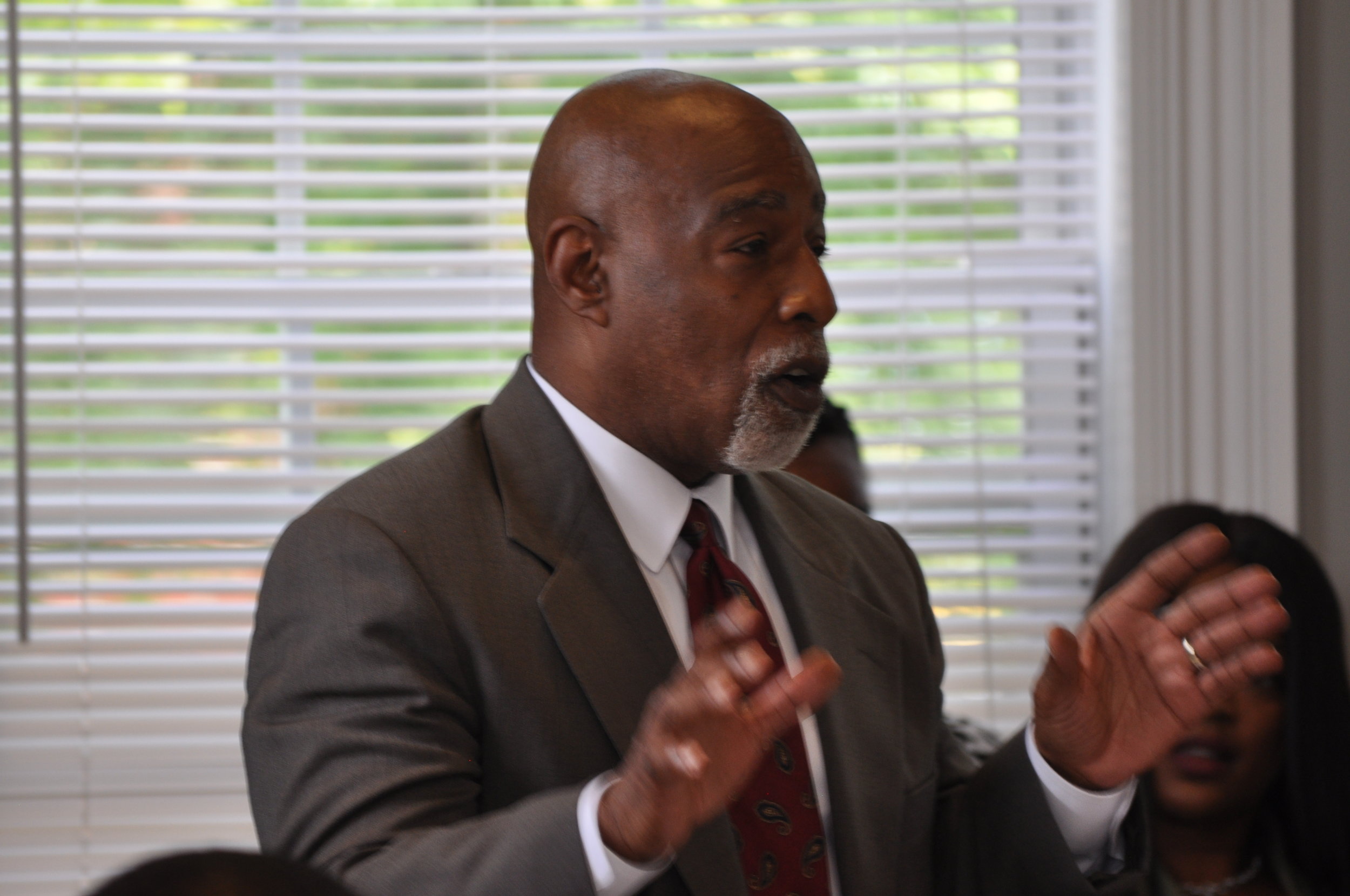Brokering For Better Business
Local Minority Business Leaders Gather Amid Frustration Over Discriminatory Contract Practices
Last Updated June 28, 2019 // 4:00 pm
By Raoul Dennis
Elsie Jacobs, president of the Suitland Action Team and MBE Compliance Manager Mirinda Jackson. PHOTO: RAOUL DENNIS // PRINCE GEORGE’S SUITE MAGAZINE & MEDIA
“I have been here for 30 years,” said Elsie Jacobs who called the meeting as a business instruction session but invited council members to attend as guests. “I have seen [black owned businesses] get passed over and disregarded. We have had enough of it. The purpose of this meeting is to get [county leaders] to understand that you have to do something about that.”
Jacobs cited no minority contractors were hired to do new work on St. Barnabas Road as an example.
County Councilman Franklin
“No one is enforcing the deal,” she said that ensures when corporations get county dollars, they include local minority companies in the work.
County Councilmembers Mel Franklin (D-At Large), Rodney Streeter (D-Dist. 7) and Calvin Hawkins (D-At Large) were invited guests. A representative attended from the Hawkins office.
While the councilmembers were not the direct target of the frustration of black-owned business leaders, they were considered a vital part of the solution.
County Councilman Streeter
“I’m a small business owner and at this point, instead of excuses, we want someone we can hold accountable. And we need a scope of work, something we can reference,” said a contractor, who didn’t identify herself, but noted that her company is consistently being underbid in ways that she believed were not fiscally feasible for any company to complete and generate a profit. “The county is not ready she said to hold these (activities) accountable.”
She continued: “All these people are coming into the county; they are redoing Suitland Road making it look pretty but what about all the businesses that have been here for 10 and 15 years that are now being kicked out?”
“There is no accountability with regard to the actions of the big corporations,” said Jacobs.
Said another business leader: “The county makes sure that they’re eligible to get the contract but who comes back to say ‘are you giving [the minority subcontractor] the business you said you were going to give?’”
The stories ranged from discriminatory practices to contractual bait-and-switch tactics (using minority firms to get government contracts and then dumping them once the contract was won) and fraud.
Franklin, a longstanding voice in the development of generational wealth inspired by the success of the county’s home-grown businesses, said that now more than ever, there is a better chance for these small companies to get fair opportunities.
“We’re here and we understand your concerns. The good news is that you have a county executive that wants to do something about that,” Franklin said. “You have council members who are serious about that.”
But he also urged that it was up to black-owned businesses to organize themselves politically.
“The minority businesses in Prince George’s County have to get organized. There is strength in numbers. In the last election, we heard from every group imaginable. They had a list of demands of what they wanted and an endorsement process. They said ‘if you want our endorsement, if you want our contributions, we want to be for x, y and z things.’ You know the group that I didn’t hear from in that entire election process? The minority business community in Prince George’s County. Not one demand, questionnaire nor process to get commitments from local candidates. You need to establish a collective voice,” he said.
But business owners replied that they receive the campaign contribution notices during election season but believe they don’t get enough back up regulation and monitoring by elected officials once outside corporations take an interest in county dollars.
“We have had this meeting before and I have been here for every meeting. We have talked about ‘relaying the information back to the office,’ and we have done all that. Now, we want to know who is responsible. It’s good that we show up but showing up is no action. We all have a story here, but we need to know what happens to change [this pattern]?”
Jeannette Hughes of Hughes Barney Investigations, LLC in Maryland and Washington, DC. The company has been based in Largo since 2005. Hughes Barney Investigations provides pre employment background screenings, security guard services and biometric fingerprinting services for Maryland.
Hughes said: “My problem is that they will win the award and then cut you out of the bid. That has happened on several occasions were the main company will change the contract with the sub after the contract has been awarded. So, there is no compliance to oversee the process after it has been awarded.”
Franklin recognized that more must be done regarding compliance and enforcement.
“We have to do right by these residents,” Franklin said. “The core of our tax base are small and minority owned businesses in Prince George’s. Historically, we have not been as concerned that we needed to be to make sure that our dollars stay with those companies. It’s been too comfortable to take those dollars and send them off to companies that are not here in the county and who don’t reflect the county’s diversity and that’s a problem. It has been a problem for years and we have put laws on the books to address that. But what we haven’t had is the kind of enforcement nor the kind of leadership within our agencies to change things. We do now with our current county executive and our current director of central services and current county council…I think we have the leadership to create the enforcement mechanisms to change the story of how things have been done.”
Jacobs was pleased with the outcome.
“At least they see where we’re coming from.”










